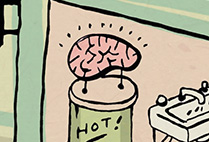Hope For a Bionic Pancreas
As the parent of a 13-year-old type 1 diabetic, I am so very grateful for the work and dedication of Ed Damiano and his team, who are developing a bionic pancreas (“Sugar Fix,” Summer 2013). The physical and emotional toll of managing this disease on a daily basis is difficult to comprehend. Each year more than 30,000 people are diagnosed with type 1 diabetes in the United States; the prevalence in Americans under age 20 has risen by 23 percent between 2001 and 2009. This is an epic and growing health crisis that demands our attention. I, and so many others, am rooting for Damiano and his team. I hope with all my heart that his son, David, can wear his bionic pancreas in time for college, as this means that my son, Matt, will benefit from this miracle as well and wear his to college, too.
Margaret Savoia (SED’97)
Nashua, N.H.
Great cover article. However, there is a rather blatant error in a diagram on page 33. The stomach and liver are mislabeled, rather embarrassing in a scientific article from a major university.
Brenda Jong (CAS’76)
Westford, Mass.
Editor’s note: We regret the error and have corrected the illustration online.
No Fan of Dieting
I am the author of four books on eating and weight and a psychotherapist who has worked in the field for more than 30 years. It’s clear to me that the Overnight Diet (“MED Prof’s Overnight Diet,” Summer 2013) is yet another fad diet. Numerous studies over the past three decades have shown that diets don’t work long-term—only 5 percent of people who diet and lose weight keep it off for good—because their very nature is artificial and restrictive of foods that people enjoy eating.
When will Americans awaken to the fact that the only effective way to have a positive relationship with food is to stop dieting and end the rebound eating that diets almost inevitably produce? Those of us who advocate intuitive and mindful eating may not generate overnight weight loss results, but we teach people how to eat all foods in moderation and according to natural appetite. And when people are more comfortable around food and in tune with their appetites, they no longer need to diet or overeat.
Karen R. Koenig (SED’69)
Sarasota, Fla.
I was disheartened to see that the Summer 2013 Bostonia highlighted Caroline Apovian’s book The Overnight Diet.
Most people accept as fact that dieting/weight loss will improve health. Yet no study has unequivocally proven this to be true. In fact, studies have consistently shown that weight cycling leads to more weight gain over time, increased risk of premature death, increased risk of binge eating, increased risk of cardiovascular disease, high blood pressure, and diabetes, and increased risk of depression, anxiety, and eating disorders.
Studies also consistently show that 95 to 99 percent of dieters will regain the weight that was lost, and often more, within five years.
A recent study in the Journal of the American Medical Association barely made news, but revealed that adults with body mass indexes between 25 and 29 (“overweight” by current US standards) are at no greater risk of mortality than adults of “normal” weight. The fact is that it is more dangerous to be 5 pounds underweight than it is to be 75 pounds overweight.
The industries profitting from our obsession with weight loss hope the truth remains a secret and dieters continue to feel like failures.
My hope is that more people work to accept their own and others’ bodies as they are and focus on improving health, not on losing weight. Studies show that health can be improved even if no weight is lost just by adding light amounts of physical activity and making small changes in nutrition (e.g., increasing high-fiber foods).
Rhonda Lee Benner (SSW’00)
North Yarmouth, Maine
Refocus Efforts on Underage Drinking
After reading “What Underage Drinkers Drink” (“Explorations,” Summer 2013), I felt compelled to react to one of Michael Siegel’s quotes. Being a retired executive of Joseph E. Seagram & Sons and being part of many strategic marketing meetings with respect to hundreds of brands and SKUs, I never heard even a whisper of targeting underage drinkers. Siegel states that “the leading culprits in the problem of underage drinking need to take immediate action to reduce the appeal of their products to youth.” At the time of my employment at Seagram, we owned Captain Morgan and held the US marketing rights to Absolut Vodka. We were also selling Seagram’s wine coolers, a product targeted at a younger demographic. As many may recall, the legal drinking age in most states had been 18 years old. Throughout time, underage drinkers have always found a product suitable to their taste and found a way to obtain it.
The real problem is not what large corporations are doing in marketing their products to younger drinkers, but what parents and/or guardians are doing to prevent their children from obtaining illegal identification and to stop them from purchasing these products. The real problem also lies with the retail stores, in all states, for having very lenient policies in selling beverage alcohol to minors. Stricter laws and penalties are needed for retailers allowing the sale of beverage alcohol to these under-21 drinkers.
Stop spending time and money analyzing what is being purchased by underage drinkers and refocus the efforts on how it is getting into their hands.
Leonard Finkel (SMG’69)
Plainview, N.Y.
Another View on Teach for America
It was with dismay that I read that Boston University had conferred an honorary degree on Wendy Kopp of Teach for America (TFA) at graduation (“Commencement 2013,” Summer 2013). My freshman roommate at BU was a student at the School of Education. She worked very hard for her degree, learning child psychology and development, pedagogy, and educational theory. When I became a teacher as a second career, I did the same. Kopp’s Teach for America, which started out as a wonderful idea, has been instrumental in replacing veteran teachers with minimally trained volunteers who have no intention of remaining in the profession. This is an affront to any serious career educator, and I am deeply disappointed in my alma mater. When TFA returns to its original mission of sending teachers to schools that can’t find qualified teachers, then she will deserve that degree.
Tracey Miller (CAS’89)
Merrick, N.Y.
Failure to Honor Silber
As an alumnus, I am very disturbed about the lack of adequate recognition of deceased President John Silber with regard to his obituary coverage in Bostonia. I would like to add my voice to that of Stephanie Herbert (“Letters,” Summer 2013): Silber at the very least should have had a front-page tribute, given his immeasurable contributions and dedication to BU.
I am sure that you are aware that most people today do not stay with a single employer for more than seven years on average or remain in a marriage for much longer than this. A quarter century as president of a national university is an immense achievement and much more difficult than the general public may acknowledge. As a former professor and department chair at Wentworth Institute of Technology, as well as an adjunct faculty member in the BU College of Engineering, I learned that the main responsibilities of a university president are to raise funds to advance the mission of its academic programs and to provide leadership vision for the future direction of the university. Regardless of what one thinks about Silber’s autocratic style or controversial views about student behavior, he clearly transformed the University from a good regional University to a nationally and internationally recognized institution of higher education excellence.
The fact that Bostonia failed to sufficiently honor Silber’s contributions and longtime service to BU with its omission of a front-cover tribute is extremely unsettling. There is no question in my mind that countless past, present, and future members of the BU community will reap immense benefits from Silber’s work. I hope that your editors and publishing staff will seize an opportunity to correct this serious injustice in a future publication. At minimum, this is what Silber and legions of BU alumni deserve. Thank you in advance for considering my heartfelt request.
Mark Frisina (ENG’80)
Sarasota, Fla.
I missed the winter-spring 2013 issue of Bostonia, so when I opened the newly arrived summer issue (“Letters”) and saw that John Silber had died and your discussion of his legacy was slipped to the very back of the magazine, I was shocked. I remember his last decade of service to the University. I’m proud that his name graces my diploma. You really should be ashamed that he wasn’t much more prominently featured.
Philip Newhall (MED’94)
Saint Louis, Mo.
Appalled at Research
Reading the article on Jonathan Appavoo and Ellen Grant (“Medicine in the Cloud,” Winter-Spring 2013), I was frankly appalled that my alma mater is involved in research to give parents a speedier access to abortion.
Having read Unplanned and having always been pro-life, it sickens me to know that an unborn child/fetus will be destroyed for any reason. There are pro-life organizations to assist parents with the help they need.
As a parent and grandparent, I believe life is the gift from which all other gifts blossom.
I can no longer support BU, as I feel like I would be a part of the horror of abortion.
Cheryl Burzynski (CAS’68)
Rockwall, Tex.
Present during COM’s Heyday
I was lucky to have attended the College of Communication during what must have been its heyday: Harold “It’s just noon; is there an eleven noon?” Banks; Jim Sullivan, who actually gave degrees of Fs—I once got an F-4 with the comment, “Much more an F-5”; and James Shen, who was class and grace personified. I can accurately report that all three and one or two others would be thrilled at how honorably the hero of an extraordinary new online book, Malvern (malvernthenovel.com), represents his alma mater and school. (Shen even gets a mention in the book.)
Beyond his meticulous observance of the rules of grammar and journalism (he even spells “ax” correctly), the hero, Rob Baltusrol, proves with a passion that all is for naught if not used in single-minded pursuit of the truth, i.e., taking the bastards on. (Oh, were it only so…)
As to the College of Communication, all us SPCers can hope only the name has changed.
C. J. Mellor (COM’81)
Savannah, Ga.
Dating the Old-Fashioned Way
As a BU graduate, I read with interest your article about dating today at BU (“It’s a Date, I Think,” Summer 2013).
My wife and I have been married for 45 years, have three married daughters, and are about to welcome our fourth grandchild into the world. My sense of socializing in my days at BU vs. today is starkly different.
My wife feels kids today have it much tougher than our generation. I disagree and here is why.
Because our daughters are of the generation in your article, I know socializing can be a group thing today. Also, on graduating, finding a job can be harrowing. But young adults today do not feel the same kind of pressures my 1960s crowd was faced with.
Imagine being a year or two on either side of 20, worrying you might be drafted, and winding up in Vietnam. BU was a hotbed of radicalism. Lots of deep dark music, long hair, and pot everywhere.
If you had sex and the girl became pregnant, often you married, which meant you had to drop out of school to support your family. So to be safe, people were careful, got the best grades they could to avoid the draft, and hoped to find a mate in school.
When I asked our 34-year-old mother-to-be (a 2001 BU grad) if “hooking up” meant having sex, she said usually that was the case. She reminded me that her generation did not go to college looking for a mate, whereas mine did (good point).
I was 21, worried about being drafted and killed, hadn’t had much sexual intimacy, and was fearful of not having a “life.” I was fortunate. I met a beautiful woman, we married, and had three children by the time we were 31 years old. We succeeded in life because we felt the need to provide. We had lots of responsibilities kids don’t necessarily have today. (We were also children of Depression-era parents, who drummed into us the need to succeed.)
Many young adults today may not be responsible for much more than themselves. It isn’t that they don’t want to go for the golden ring, as I am sure many do. But without a great deal of responsibility to satisfy, there may not be the same drive, so life and dating become more casual.
Information about people can be found on Google or Facebook. Sex is more common (as are abortions), so why get married? Often parents may be able to carry some of the financial load. All of this adds up to a much more relaxed attitude about dating.
I prefer our dating practices. We didn’t “hang out.” There was a great deal of planning, romance, and one-on-one communication. But that was then and this is now. And I do not think either generation had/has it easy.
Frank Gunsberg (SMG’67)
Englewood, N.J.













































Related Stories
When Healthy Eating Becomes an Obsession
SAR nutritionist on the dangers of orthorexia
The Powerlifter
Champion Molly Kelly (CAS’15) is not just “strong for a girl”
Do Jell-O Shots Lead to Bingeing by Underage Drinkers?
SPH study finds users “significantly more likely to drink heavily”
Post Your Comment